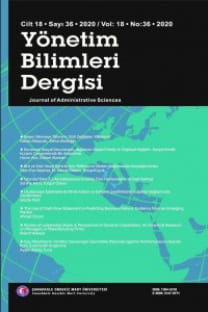A Neuroeconomic Approach To The Rationality And Homoeconomicus Concepts And The Research Discussed In The Frontal Lobe, Reptilian Brain And Serotonin Levels Basis
Neuroeconomics, Methodology, Serotonin, Frontal Lobe, Reptilian Brain, Consumption
___
- CAMEER, Colin ve George Loewenstein ve Drazen Prelec (2005). “How Neuroscience Can Inform Economics”, Journal of Economic Literature, 36, 63, 31. DUMAN KURT, Sumeyra (2011). Davranışsal Ekonomi Yaklaşımlarının Tüketici Karar Verme Tarzları ile Açıklanması ve Bir Uygulama, İzmir: T.C.Dokuz Eylül Üniversitesi Sosyal Bilimler Enstitüsü İşletme Anabilim Dalı İşletme Programı Doktora Tezi. FISHER, Carl Eric vd. (2010), “Defining Neuromarketing: Practices and Professional Challenges”, National Institutes of Health, 18, 4, 230. GÜLEÇ, Cengiz (2004). “Homo Economicus, Psikiyatri, İktisat ve Ötesi”, İstanbul Üniversitesi İktisat Fakültesi Mezunlar Cemiyeti İktisat Dergisi, 40, 9, 453. KARABIYIK, Hüseyin Çağatay (2016), Nöropazarlama Çerçevesinde Tüketici Teorisi ve Yeniden Tanımlanması Gereken Homoekonomikus Kavramı, Konya: T.C.Konya Necmettin Erbakan Üniversitesi Sosyal Bilimler Enstitüsü Yüksek Lisans Tezi. KAYNAŞ, Meltem (2012). Tüketicilerin Mantıksal Olmayan Davranışlarının Ekonomik Sonuçları, İstanbul: T.C.İstanbul Kültür Üniversitesi Sosyal Bilimler Enstitüsü Yüksek Lisans Tezi. LeDOUX, Joseph (2000). “Emotion Circuits in the Brain”, Annu.Rev.Neuroscience, 4, 23, 155. LeDOUX, Joseph (2003). “The Emotional Brain, Fear, and the Amygdala”, Cellular and Molecular Neurobiology, 23, 4-5, 727. LeDOUX, Joseph (2015). “Feelings: What Are They & How Does the Brain Maket hem?”, American Academy of Arts & Sciences, 10, 11, 96. PRASCHAK-RIEDER, Nicole vd. (2008). “Seasonal Variation in Human Brain Serotonin Transporter Binding”, Arch Gen Psychiatry, 9, 65, 1072. RENVOISE, Patrick ve Christophe Morin (2015). Nöromarketing, 3.Baskı, İstanbul: Mediacat Kitapları. SALANT, Priscilla ve Don A. Dillman (1994). How to Conduct Your Own Survey, 1.Baskı, New York: John Wiley & Sons Inc. SOYDAL, Haldun (2010). Yeni Ekonomi, 1.Baskı, Konya: Palet Yayınları. SOYDAL, Haldun ve Zekeriya Mızrak ve Fatma Nur Yorgancılar (2010). “Nöro Ekonomi Kavramı’nın İktisat Bilimi İçindeki Yeri, Önemi ve Bilimselliği”, SÜ İİBF Sosyal ve Ekonomik Araştırmalar Dergisi, 6, 13, 215. SUTHERLAND, Stuart (2013), Irrationality: The Enemy Within, London: Pinter&Martin Ltd. ŞENİĞNE, Billur (2011). Rasyonalite Kavramına Deneysel ve Davranışsal İktisat Bağlamında Yeni Bir Bakış Açısı: “Nöroiktisat”, İstanbul: T.C.Marmara Üniversitesi Sosyal Bilimler Enstitüsü İktisat Anabilim Dalı Uluslar Arası İktisat Bilim Dalı Doktora Tezi. VAN PRAAG, Bernard M.S. (1991). “Ordinal and Cardinal Utility: An Integration of the Two Dimensions of the Welfare Concept”, Journal of Econometrics, 79, 50, 69.
- ISSN: 1304-5318
- Yayın Aralığı: 4
- Başlangıç: 2003
- Yayıncı: Yönetim Bilimleri Dergisi
Bütünleşik Kalite ve Çevre Yönetimi Uygulamaları: Kavramsal Bir Model Önerisi
Özlem AYAZ ARDA, Ekrem TATOĞLU, Lütfihak ALPKAN
Planning Education in the Case Study of the Course of Metropolitan Planning in Istanbul
Social Network: An Emerging Income Distribution Mechanism In Transitional Urban China
Tüketici Tatmininde Ürün Yeniliklerinin Etkisini Belirleme: Yeşil Perspektif
Hande Begüm BUMİN DOYDUK, Cansu AYKAÇ
BİST Şehir Endeksleri Oynaklığının DCCGARCH Model İle Analizi
Özel Sektör Örgütlerinde Politik Beceri İle İzlenim Yönetimi İlişkisi
Asseing The Effect Of Product Innovations On Consumer Satisfaction: A Green Perspective
Batılı Kuramlar Çerçevesinde Sosyal Diyalog ve Türk Çalışma İlişkilerini Açıklama Denemesi
Duygusal Zeka, Problem Odaklı Stresle Başa Çıkma, İyileşme ve Duygusal Tükenme İlişkileri
